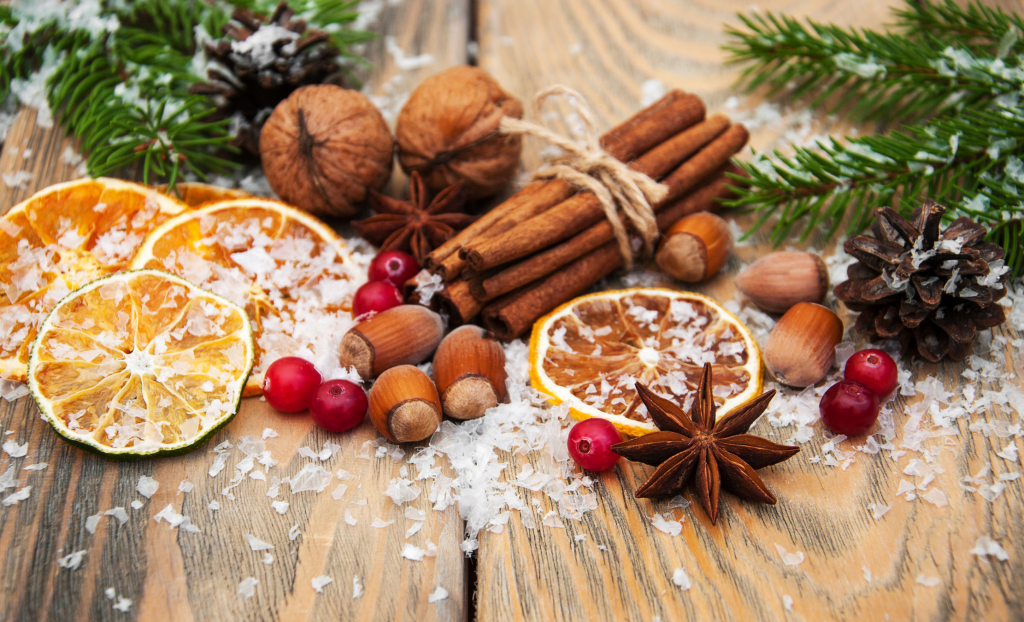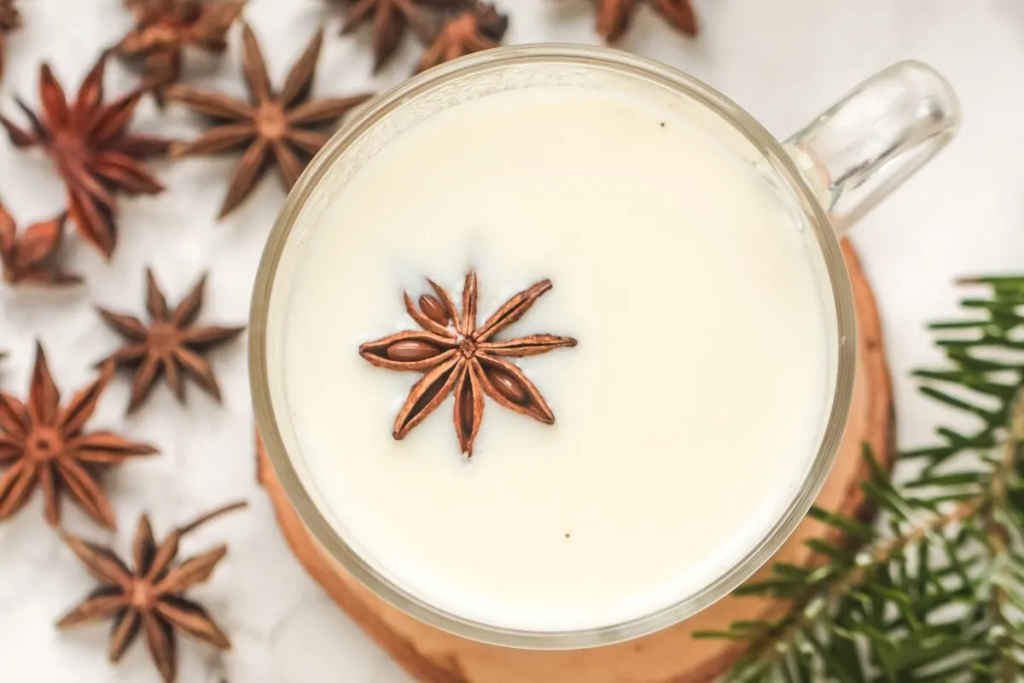Whether it’s the sweet smell of allspice simmering in a pot of mulled wine on the stove or the warm citrusy aroma of ginger in a newly baked batch of cookies, few smells in the kitchen can evoke the feeling of Christmas like spices. Cinnamon, nutmeg, clove, and allspice have become synonymous with the holidays.

The holiday season is a time of joy, celebration, and delicious food. One of the key elements that make holiday dishes so memorable is the use of spices. From sweet treats to savory dishes, spices bring warmth and depth of flavor that are quintessential to holiday cooking. This article explores the most popular holiday spices and how they can elevate your festive culinary creations.
But where did these fantastically fragrant spices come from?
Keep reading to learn a bit more about some of your favorite spices that are sure to put you in a festive mood!
Cinnamon
With its warm, spicy aroma, cinnamon has the power to induce a degree of nostalgia that few other spices can match. It makes us think of apple pie, of sweet-smelling curls of steam lifting off warm mugs of apple cider.

Cinnamon is perhaps the most iconic holiday spice, known for its sweet and warm flavor.
Uses:
- Baking: Cinnamon is a staple in holiday baking, used in cookies, cakes, and pies.
- Beverages: Add a cinnamon stick to mulled wine, cider, or hot chocolate for a festive twist.
- Savory Dishes: Sprinkle cinnamon in stews, curries, or roasted vegetables for a hint of sweetness.
Cinnamon comes from the bark of a bushy evergreen tree, Cinnamomum, native to Sri Lanka. This rich brown spice was once more valuable than gold and was used in Egypt for embalming and religious rites. Later on, in medieval Europe, the use of cinnamon for flavoring in foods became a symbol of the upper classes. Sought after for its many benefits, whether culinary, medicinal, or religious, cinnamon became the most profitable spice in the Dutch East India Company trade.
Cinnamon is made from the cutting of the inner bark of the Cinnamomum tree. When the bark dries, the strips curl into rolls called cinnamon sticks. These sticks can either be sold whole or ground into powder.
Cassia is the more common type of cinnamon, the variety found in most kitchens today. It has a strong, spicy, and slightly bitter flavor. Ceylon, or “”true”” cinnamon, has a more delicate, floral-like flavor, is more highly prized and thus more expensive
From curries to pastries to drinks, cinnamon is used to flavor various foods. It’s commonly used in apple pie, is delicious as a rub on roasted root vegetables, and adds warmth and depth to rice pudding. And don’t forget about cinnamon rolls.
Wondering how to use cinnamon in the kitchen this holiday season? Why not try some warming seasonal drinks? The Spruce Eats has a delicious spiced mulled wine that will have you belting out Christmas carols in no time. Or, if you want something a little quieter and cozier, this recipe for spiced apple cider will feel like a big ‘ole hug in a mug.
Beyond being the perfect thing to spice up a variety of dishes and beverages, cinnamon is loaded with antioxidants. In a study that compared the antioxidant activity of a number of spices, cinnamon came out on top. It even beats out superfoods like garlic and oregano. As if you needed another reason to spice up your life with cinnamon!
Star Anise
Native to Southwest China, star anise gets its name from its star-shaped pods with an average of eight points, each holding a single pea-sized seed. This spice has been used for medicine and to flavor food for over 3,000 years. An English sailor picked up star anise during his travels and brought it back to Europe, where it quickly became popular.

Star anise offers a sweet, licorice-like flavor that is both unique and festive.
Uses:
- Beverages: Perfect for mulled wine, cider, and herbal teas.
- Baking: Use in cookies, cakes, and pastries for a distinctive taste.
- Savory Dishes: Incorporate into stews, braises, and soups for a depth of flavor.
Star anise is warm, sweet, and spicy and has a strong flavor similar to licorice and fennel. Because of its sweet flavor, star anise was initially used most commonly to flavor puddings and jams. Today it is often used in savory dishes as well. In Western cultures, star anise is frequently used to flavor liqueurs such as absinthe, sambuca, and pastis. It’s a mainstay in Chinese cooking and is one of the primary flavors in Chinese five-spice powder. The fragrant aroma of the well-known Vietnamese soup, Pho, gets its characteristic smell from star anise mixed with a variety of other spices, many of which are on this list.
When using star anise in cooking, the technique will vary depending on whether ground star anise or whole pods are being used. While the entire pod can be simmered in sauces and sauces and soups to impart its sweet licorice-like flavor, they don’t soften as they cook and are therefore inedible. Cooking with the entire pod can be tricky; with their robust flavor they can easily overpower other flavors if put in too early or left cooking for too long. Ground star anise is much easier to work with and can be used in most recipes that call for the pod. Use ½ teaspoon of the ground spice for every whole pod a recipe requires.
No traditional Christmas table is complete without a cheerful cranberry dish to brighten up the holiday spread. This tangerine cherry cranberry sauce from Allrecipes.com uses not just star anise, but many of the other warming holiday spices you’ve been reading about. And if you’re looking for small gifts to give family and friends, whip up this spiced salt recipe from the NY Times. The salt can be used to zest up salads and pastas or rubbed onto proteins and veggies before roasting. Pop it into little mason jars, wrap with ribbon, and you’ve got a cute little culinary party favor to give to guests!
Are you wondering how to put those flavors all together?
In “Vegan Pastry Essentials”, you’ll be preparing a wonderful Christmas apple cake where you’ll put all those exciting flavors together.
Cloves
One of the oldest spices in existence, cloves are the small reddish-brown bud of an evergreen tree native to the Molucca Islands of Indonesia. Though you most likely know cloves for their use in the kitchen, they’ve been used in Ayurvedic and Chinese medicine for thousands of years. As early as 200 BCE, envoys from Java to the court of the Han Dynasty of China held cloves in their mouths to perfume their breath during audiences with the emperor.

Cloves have a strong, pungent flavor that can enhance a variety of dishes.
Uses:
- Baking: Cloves are commonly used in spice cakes, cookies, and pumpkin pies.
- Beverages: Add whole cloves to mulled wine, cider, or spiced tea.
- Savory Dishes: Use cloves in meat glazes, marinades, and rice dishes.
Cloves have an intense aroma and a hot, almost bitter flavor that’s counteracted with hints of woody sweetness. Cloves have the most powerful flavor profile of all the spices on this list, so it’s a good idea to use them sparingly and stick to the amount a recipe calls for. If used too much, they can completely overpower a dish and even make it taste bitter. However, a small amount can add a pleasant warm pepperiness to sweet and savory foods. This spice can be used in whole or ground form. Whole cloves impart a fuller, more intense flavor. Just be sure to remove them all before serving!
In Europe and the United States, cloves are a characteristic flavoring in traditional Christmas dishes and drinks such as wassail (mulled wine) and mincemeat, a dish which once included meat but today is typically made of sweet, spiced fruits. Cloves are also a main ingredient in Worcestershire sauce and are often used to add spiciness to jams and pickling mixtures.
If you’re interested in using cloves this holiday season, we’ve got you covered with a few side desserts that spotlight this fantastic spice. This vegan apple cobbler with cloves and allspice from the Spruce Eats is full of warm, spicy flavors and will have your family and friends questioning if it’s really and truly vegan!
Ginger
If you’re one of our faithful readers (and we hope you are!) then you may have learned about ginger in our post “What is Ginger and How Do You Use it in the Kitchen?” Apart from being delicious in stir-fries and Asian sauces, ginger is a quintessential holiday spice.
Ginger’s spicy and slightly sweet flavor is a holiday favorite.
Uses:
- Baking: Essential for gingerbread cookies, cakes, and muffins.
- Beverages: Fresh ginger adds a zesty kick to teas, punches, and cocktails.
- Savory Dishes: Use ginger in marinades, stir-fries, and stews for added depth.
With its tangy freshness and mellow sweetness, ginger complements a wide range of sweet and savory dishes. During the Christmas season, ginger is typically used in baked goods and can be either the star of the show, as with gingerbread, or be mixed with other flavors such as in pumpkin pie.

With all the shopping, cooking, and socializing that happens during the holiday season, who has time for the sniffles? Good news! Ginger not only has culinary superpowers, it also boosts your immune system. So whether you’re gobbling up some gingerbread men or sipping on a warm cup of ginger tea, this spice will help to keep that winter cold away!
If ‘you’ve got a sweet tooth, ‘we’ve got you covered with these dessert recipes that showcase the wonderful spiciness of ginger. Bake up a warm batch of gluten-free gingerbread cookies by the Minimalist Baker or invite pumpkin to the party with this recipe for vegan pumpkin gingerbread pie.
Nutmeg
The seed of a peach-like fruit from an Indonesian evergreen tree called Myristica fragrans, nutmeg has quite a spicy history. A history that isn’t very Christmas-y at all.

Nutmeg offers a warm, nutty flavor that complements both sweet and savory dishes.
Uses:
- Baking: Nutmeg is often used in cookies, cakes, and holiday breads.
- Beverages: Grate a pinch of nutmeg into eggnog, coffee, or tea.
- Savory Dishes: Incorporate nutmeg into creamy sauces, soups, and vegetable dishes.
This spice dates back to the 1st century BCE, when it was considered a high currency for trade. It was even the cause of war. Wanting to create a nutmeg monopoly in the trading world, the Dutch conquered the Banda Islands of Indonesia in a not-so-friendly manner. Their successful monopolistic hold on the nutmeg trade gave birth to the Dutch East India Trading Company.
Today India is the largest exporter of nutmeg in the world, with the Netherlands, Indonesia, UAE, and Sri Lanka all following closely behind.
Nutmeg is earthy, nutty, and slightly sweet and has a strong, easily identifiable aroma. To those sensitive to spiciness in food, nutmeg might pack a bit of a peppery punch. The full flavor of this spice is best experienced in buttery and creamy dishes that can help mellow out the nutmeg’s bite.
Despite what many may think, eating vegan doesn’t mean giving up those creamy and buttery dishes that make nutmeg a star. Want proof? Try drizzling this vegan bechamel by the Minimalist Baker over roasted asparagus, and you’ll have yourself a spicy, creamy Christmas side dish everyone will love.
Allspice
Contrary to what its name might make you think, allspice isn’t a blend of other spices. A relative of the clove, allspice is the dried brown berry of the tropical tree, Pimenta dioica, a member of the myrtle family. It’s native to the West Indies and Central America.

Allspice combines flavors of cinnamon, nutmeg, and cloves, making it a versatile spice.
Uses:
- Baking: Allspice is often used in cakes, cookies, and pumpkin pies.
- Beverages: Add to mulled wine, cider, or hot chocolate for a complex flavor.
- Savory Dishes: Use in marinades, sauces, and savory spice rubs.
Though christened “allspice” in Europe because it tastes like a mix of spices, this spice goes by several other names. Because it resembles peppercorns in shape and color, it’s also called Jamaican pepper and myrtle pepper.
The name makes the taste of this spice quite understandable with its strong flavors of clove, nutmeg, and cinnamon. Like many other spices on this list, the warm taste of allspice makes it the perfect thing to add to apple or pumpkin pie.
Like cloves, allspice berries are hard and should either be ground or simmered in a sauce and scooped out before serving. Many find ground allspice easier and quicker to work with, and it’s perfectly acceptable to use in any recipe. Just remember that like other spices, allspice in its whole form stays fresh for longer and imparts a more robust flavor.
This Christmas Eve, whether you’re listening to the chatter of friends and family or enjoying some well-deserved time alone, treat yourself to a mug of hot chocolate with a pinch of allspice added in. The allspice’s unique aroma and flavor combined with chocolate make for the perfect indulgent holiday drink.
Vanilla

Vanilla’s sweet and aromatic flavor is indispensable in holiday cooking.
Uses:
- Baking: Vanilla extract is a must-have for cakes, cookies, and pastries.
- Beverages: Enhance the flavor of hot chocolate, coffee, and milkshakes.
- Savory Dishes: Use vanilla in sauces, glazes, and savory dishes for a subtle sweetness.
These popular holiday spices—cinnamon, nutmeg, ginger, cloves, allspice, star anise, cardamom, and vanilla—are essential for creating the warm, comforting flavors that define the season. By incorporating these spices into your holiday recipes, you can elevate your dishes and bring a festive spirit to your table. Whether you’re baking, cooking savory meals, or preparing festive beverages, these spices will add a touch of holiday magic to your culinary creations.
Wishing you a spicy and sweet holiday season from everyone. Happy Holidays!!


